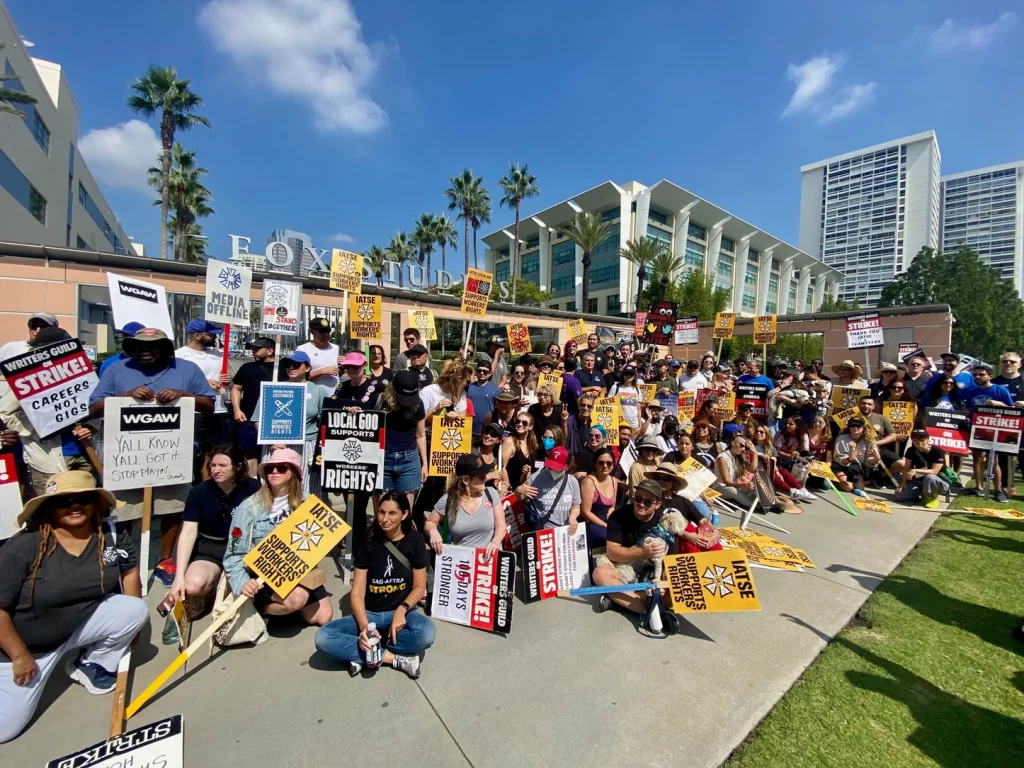
The SAG-AFTRA and WGA Strikes
The Screen Actors Guild and American Federation of Television and Radio Artists (SAG-AFTRA) joined the Writers Guild of America (WGA) on strike, starting July 14, 2023. Both organizations have been striking against the Alliance of Motion Picture and Television Producers (AMPTP) for an agreement for job security against threats such as AI, increased pay to match inflation, and against exploitation of the workers. This has been the first time since 1960 that both organizations have gone on strike simultaneously against the AMPTP.
The reason for the WGA strikes can be boiled down to the increase in streaming platforms over the past few years, as well as the uncertain rise of AI. Before the rise of streaming, a writer who worked on a show would receive the residuals of their episode after it was broadcasted on TV. However, companies have started using subscriptions for revenue, only giving writers a small cut of the overall revenue. Companies began using their previous contracts with the WGA to make more profit from the work of writers, and only pay them a small percentage of what they would have made from broadcasting. Writers are asking for fairer wages, as well as job protection from AI from producing new material, rewrite material, or use of their previous work to train machines. As of September 27, 2023, the WGA have officially called an end to the strike, reaching a deal with the AMPTP.
The official website of the WGA wrote on March 14, 2023: “The companies have used the transition to streaming to cut writer pay and separate writing from production, worsening working conditions for series writers at all levels. On TV staffs, more writers are working at minimum regardless of experience, often for fewer weeks, or in min-rooms, while showrunners are left without a writing staff to complete the season. And while series budgets have soared over the past decade, median writer-producer pay has fallen.”
In addition to the WGA, the SAG-AFTRA have also gone on strike against the AMPTP, striking against the exploitation of their workers. Some examples of this exploitation include a company’s proposals of using AI to pay extras once to continue using their likeness in future productions, refusal to increase pay based on inflation or keep health funds sustainable, and much more. SAG-AFTRA members mentioned that they wanted to avoid a strike. However, the strike officially began on July 14, when the AMPTP continued to reject and refuse to acknowledge the proposals of SAG-AFTRA.
The official SAG-AFTRA website writes: “We’re fighting for the survival of our profession…We’re up against a system where those in charge of multibillion-dollar media conglomerates are rewarded for exploiting workers. The companies represented by the [AMPTP]…are committed to prioritizing shareholders and Wall Street…from day one they wouldn’t meaningfully engage on the most critical issues.”
The strikes have halted the writing, acting and filming of upcoming movies and television shows, as well as delaying the releases of others. These strikes are nationwide, from Hollywood, Los Angeles, to Manhattan, New York. They have done picket lines to shut down productions, interrupted filming, and disrupted corporation studios, such as Nexflix, Disney, Amazon, and more. Recently, the strikes have even expanded to the video game industry, in which the SAG-AFTRA National Board has unanimously voted for a strike authorization for Interactive Media (Video Games), who are also seeking protection from the use of AI to replace workers and wage increases to keep pace with inflation. If the negotiations between SAG-AFTRA and video game companies fail, the strike authorization permit will allow the declaration of a strike. SAG-AFTRA is set to bargain with AMPTP shortly, which can soon call to the end of these strikes as well.
“We are the victims here. We are being victimized by a very greedy entity. I am shocked by the way the people that we have been in business with are treating us.” Actress and President of SAG-AFTRA Fran Drescher said in a speech about the strike. “They stand on the wrong side of history at this very moment. We stand in solidarity. In unprecedented unity. Our union and our sister unions and the unions around the world are standing by us as well as other labor unions because at some point the jig is up. You cannot keep being dwindled and marginalized and disrespected and dishonored. The entire business model has been changed by streaming, digital, AI. This is a moment of history that is a moment of truth.”
Writers and actors love their work as much as consumers love them. Many members of SAG-AFTRA and WGA have repeatedly said they never wanted to strike, especially with the state of the world, but corporations have pushed them to do so. While the delays of awaited productions can be frustrating, people standing in solidarity with the striking organizations can show corporations that writers and actors have the support of the consumers, bringing the strikes to an end sooner rather than later.